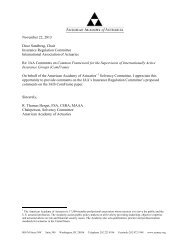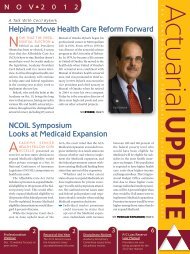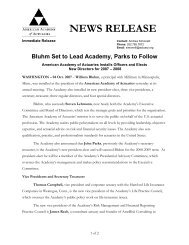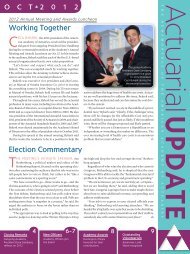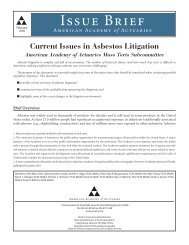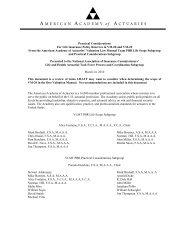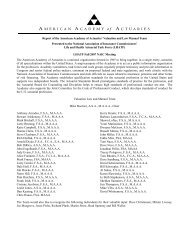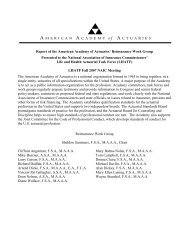Mental health parity - American Academy of Actuaries
Mental health parity - American Academy of Actuaries
Mental health parity - American Academy of Actuaries
Create successful ePaper yourself
Turn your PDF publications into a flip-book with our unique Google optimized e-Paper software.
A<br />
De ce m be r<br />
2 0 0 4 I<br />
SSUE B RIEF<br />
A MERICAN A CADEMY <strong>of</strong> A CTUARIES<br />
<strong>Mental</strong> Health Parity:<br />
Often Separate, Usually Unequal<br />
The federal <strong>Mental</strong> Health Parity Act <strong>of</strong> 1996 went into effect on January 1, 1998. The Act does not, however, mandate that <strong>health</strong><br />
plans include mental <strong>health</strong> benefits. Instead, it simply prohibits <strong>health</strong> insurers and self-funded employers that <strong>of</strong>fer mental<br />
<strong>health</strong> benefits from limiting the total annual and lifetime dollars spent on mental <strong>health</strong> per person to a lower dollar amount<br />
than that for other medical care. Nevertheless, plans still have two ways to provide a lower level <strong>of</strong> mental <strong>health</strong> benefits. The<br />
first is to apply “inside limits” to mental <strong>health</strong> benefits, that is to limit the number <strong>of</strong> mental <strong>health</strong> <strong>of</strong>fice visits per year or number<br />
<strong>of</strong> days in the hospital for mental <strong>health</strong>. The second is to impose higher cost-sharing for mental <strong>health</strong> visits, services, or hospital<br />
admissions than for other medical care. Initially, some <strong>health</strong> insurers and self-funded employers reacted to the Act by eliminating<br />
all mental <strong>health</strong> benefits from their <strong>health</strong> plans. The other and more common reaction was an increased use <strong>of</strong> inside<br />
limits or greater member cost-sharing for mental <strong>health</strong> benefits.<br />
Current proposals would extend mental <strong>health</strong> <strong>parity</strong> requirements by removing these methods <strong>of</strong> providing lower mental<br />
<strong>health</strong> benefits. A potential move to more comprehensive mental <strong>health</strong> <strong>parity</strong> raises concerns that its additional costs would exacerbate<br />
the problem <strong>of</strong> access to affordable <strong>health</strong> care coverage.<br />
<strong>Mental</strong> <strong>health</strong> costs under full pa ri ty could be affe cted by incre a sed uti l i z a tion in mental <strong>health</strong> tre a tm ent and prescri<br />
ption psych otropic drug usage . Costs could also be tra n sferred from the pu blic se ctor to the insu red popu l a tion if servi<br />
ces curren t ly covered by Medicaid were shifted to priva te <strong>health</strong> pl a n s . On the ot h er hand, propo n ents <strong>of</strong> m o re co m preh<br />
en s ive mental <strong>health</strong> pa ri ty argue that adequate and appropri a te mental <strong>health</strong> care could lead to redu ced medical co s t s<br />
and less lost time at wo rk . Un d er expa n d ed pa ri ty, the use <strong>of</strong> m ental <strong>health</strong> managed care te chniques could prevent ra p i dly<br />
esc a l a ting mental <strong>health</strong> costs by co n trolling over- u ti l i z a tion while sti ll providing need ed servi ce s .<br />
To develop a balanced solution, it is important to better understand current mental <strong>health</strong> <strong>parity</strong> requirements and how<br />
group plans 1 typically address mental <strong>health</strong> coverage, as well as the cost implications <strong>of</strong> <strong>parity</strong> requirements. In this issue brief,<br />
we first describe current mental <strong>health</strong> <strong>parity</strong> requirements and how group insurance plans have responded to these requirements.<br />
We next discuss the cost implications <strong>of</strong> expanded mental <strong>health</strong> <strong>parity</strong> requirements, including the impact on other medical costs.<br />
The Am e ri can <strong>Academy</strong> <strong>of</strong> Act u a ries is the public po l i cy organization for act u a ries pra cticing in all specialties within the United State s. A major purpose <strong>of</strong> the <strong>Academy</strong> is to act<br />
as the public information organization for the pro fe s s i o n .The <strong>Academy</strong> is nonpartisan and assists the public po l i cy process through the presentation <strong>of</strong> clear and object i ve act u -<br />
a rial analys i s. The <strong>Academy</strong> re g u l a rly pre p a res testimony for Co n g re s s, p rovides information to fe d e ral elected <strong>of</strong>ficials, comments on pro posed fe d e ral re g u l a t i o n s, and wo r k s<br />
c l o s e ly with state <strong>of</strong>ficials on issues re l a ted to insura n ce. The <strong>Academy</strong> also develops and upholds act u a rial standards <strong>of</strong> co n d u ct, q u a l i f i cation and pra ct i ce, and the Code <strong>of</strong><br />
Pro fe sional Co n d u ct for act u a ries pra cticing in the United State s.<br />
M e m bers <strong>of</strong> the <strong>Mental</strong> Health Pa ri ty Work Group include: Donna C. Nova k ,A S A , M A A A , F CA ,Ch a i r pe r s o n ; John K.An d e r s o n , F S A ,M A A A ; Ronald E.Ba c h m a n , F S A , M A A A ; Da n i e l<br />
W. Ba i l ey, A S A , M A A A ; James M. Gu t te r m a n , F S A , M A A A ; Joseph G. Ko ra b i k , F S A , M A A A ; Al exander D. Ma re k , F S A , M A A A ; S tephen P. M e l e k , F S A , M A A A ; John A. Pri ce, M A A A , F CA ;<br />
and Co u rt n ey R. Wh i te, F S A , M A A A .<br />
A<br />
A MERICAN A CADEMY <strong>of</strong> A CTUARIES<br />
1100 Seventeenth Street NW Seventh Floor Washington, DC 20036<br />
Tel 202 223 8196 Fax 202 872 1948<br />
www.actuary.org<br />
Richard C. Lawson, Executive Director<br />
Noel Ca rd, Di re ctor <strong>of</strong> Co m m u n i cat i o n s<br />
Craig Ha n n a , Di re ctor <strong>of</strong> Public Po l i cy<br />
Co ri E. Uc ce l l o, Senior Health Fe l l ow<br />
Holly Kw i at kows ki , Senior Health Po l i cyAn a l ys t, Fe d e ra l<br />
©2004 The Am e ri can <strong>Academy</strong> <strong>of</strong> Act u a ri e s. All Rights Re s e rve d.
Me ntal Health Pa ri ty Re q u i re m e nt s<br />
Health insu ra n ce covera ge <strong>of</strong> ten treats mental <strong>health</strong> servi ces differen t ly than other medical servi ce s . Th e<br />
n eed for mental <strong>health</strong> care can be more su bj ective than the need for medical care , and the set ti n g, term ,<br />
or ex tent <strong>of</strong> m ental <strong>health</strong> care depends on va rious factors including wh et h er insu ra n ce covera ge is pres<br />
ent and if s o, the natu re and ex tent <strong>of</strong> covered servi ce s .<br />
Implicit in the term pari ty is the abi l i ty to com p a re two or more things fairly but mental <strong>health</strong> care is,<br />
by its natu re , difficult to com p a re with other medical servi ce s . Ex i s ting laws and ad d i ti onal propo s ed laws<br />
a t tem pt to cre a te more pari ty bet ween mental <strong>health</strong> covera ge and other medical covera ge . Nevert h el e s s ,<br />
h ow pari ty requ i rem ents are app l i ed can va r y gre a t ly under va rious laws and propo s a l s .<br />
<strong>Mental</strong> <strong>health</strong> pari ty requ i rem ents are def i n ed differen t ly ac ross states and also at the federal level .<br />
Proposals to expand pari ty requ i rem ents can also differ rega rding specific provi s i on s . The aspects that can<br />
va ry inclu de :<br />
• Trea tm ent set ti n g : i n p a ti ent versus outp a ti ent versus altern a tive set ti n gs<br />
• D i a gnoses covered : bi o l ogi c a lly - b a s ed diagnosis versus all diagn o s e s<br />
• Su b s t a n ce abuse covera ge : m ental <strong>health</strong> on ly versus the inclu s i on <strong>of</strong> su b s t a n ce (drug and alcohol)<br />
a buse tre a tm en t<br />
• Co s t - s h a ri n g : the same or similar cost sharing as medical and su r gi c a l<br />
• In su ra n ce type : <strong>health</strong> insu ra n ce versus disabi l i ty insu ra n ce versus other covera ges<br />
• Peri od <strong>of</strong> trea tm en t : ac ute versus lon g - term stays<br />
Fed eral <strong>Mental</strong> Health Pa ri ty Law. The <strong>Mental</strong> Health Pa ri ty Act <strong>of</strong> 1996 legi s l a ted that the annual and<br />
l i fetime limits on mental <strong>health</strong> must be gre a ter than or equal to the annual and lifetime limits on medical<br />
and su r gical ben ef i t s . The law applies to all sel f - i n su red em p l oyers and fully insu red em p l oyers wi t h<br />
m ore than 50 em p l oyees that provi de mental <strong>health</strong> covera ge . Federal pari ty requ i rem ents do not, h owever,<br />
en compass covera ge for su b s t a n ce abuse or ch emical depen dency tre a tm en t s .<br />
The ex i s ting federal law does not requ i re that a plan provi de any mental <strong>health</strong> ben ef i t s . For plans <strong>of</strong> fering<br />
ben ef i t s , the federal law all ows plans to define what con d i ti ons are covered and to adopt va rious limi<br />
ting fe a tu res on mental <strong>health</strong> ben ef i t s , su ch as high er co s t - s h a ring requ i rem ents or limits on the nu mber<br />
<strong>of</strong> i n p a ti ent days or outp a ti ent vi s i t s . These are com m on fe a tu res in many ben efit plans <strong>of</strong> fered tod ay.<br />
Groups that can dem on s tra te that the law led to more than a 1 percent cost increase were also exem pted<br />
f rom the law ’s requ i rem en t s . 2<br />
<strong>Mental</strong> Health Def i n i tion in Fed eral Propo s a l s . Si n ce its implem en t a ti on , n ew federal proposals have<br />
been pre s en ted that would ex tend the 1996 Act . A major initi a tive recen t ly con s i dered in Con gress is the<br />
Sen . Paul Well s tone <strong>Mental</strong> Health Equ i t a ble Tre a tm ent Act <strong>of</strong> 2003 (S. 4 8 6 ) , wh i ch would pro h i bi t<br />
redu ced ben efits for mental <strong>health</strong> illnesses com p a red to other medical ben ef i t s . The proposal def i n e s<br />
m ental <strong>health</strong> ben efits to inclu de servi ces for all mental <strong>health</strong> con d i ti ons listed in the Di a gn o s tic and<br />
S t a ti s tical Ma nual <strong>of</strong> <strong>Mental</strong> Di s orders (DSM) if su ch servi ces are inclu ded as part <strong>of</strong> an aut h ori zed tre a tm<br />
ent plan (although the bi ll spec i f i c a lly exclu des the ex ten s i on <strong>of</strong> its requ i rem ents to the tre a tm ent <strong>of</strong><br />
su b s t a n ce abuse and ch emical depen den c y ) . In other word s , i n su rers would not be all owed to exclu de specific<br />
ill n e s s e s . However, plans would retain the abi l i ty to exclu de covera ge for specific servi ce s . Moreover,<br />
the proposal would sti ll not requ i re plans to provi de mental <strong>health</strong> covera ge .<br />
St a te <strong>Mental</strong> Health Pa ri ty Laws . Ne a rly all states have passed legi s l a ti on para ll el to the limited federa l<br />
<strong>Mental</strong> Health Pa ri ty Act <strong>of</strong> 1 9 9 6 . Approx i m a tely 30 states have passed broader mental <strong>health</strong> pari ty laws<br />
2 ISSUE BRIEF DECEMBER 2004
s i n ce the early 1990s, a l t h o u gh they use no com m on language or approach . Some states inclu de a broad<br />
def i n i ti on <strong>of</strong> m ental <strong>health</strong>, o t h ers limit the pari ty ben efits to sel ected bi o l ogi c a lly based mental <strong>health</strong> illn<br />
e s s e s , 3 and others spec i f i c a lly exclu de covera ge for su b s t a n ce abuse and/or ch emical depen den c y.<br />
I m p l e m e nt ation <strong>of</strong> Cu rre nt Me ntal Health Pa ri ty Re q u i re m e nts<br />
Most <strong>health</strong> plans inclu de some form <strong>of</strong> m ental <strong>health</strong> covera ge , e s pec i a lly those invo lving managed care .<br />
At a minimu m , t h ey cover what is requ i red by the state , but some <strong>health</strong> plans cover more than the statutory<br />
requ i red minimu m . The statutory requ i red minimum for mental <strong>health</strong> ben efits va ries by state . E ach<br />
s t a te may also requ i re <strong>health</strong> carri ers to make ad d i ti onal mental <strong>health</strong> ben efits ava i l a ble to com m erc i a l<br />
groups under a mandator y “m a ke ava i l a bl e” ri der. The em p l oyer group then has the ch oi ce <strong>of</strong> wh et h er to<br />
s pend ex tra for the ad d i ti onal ben ef i t s . Pa rti c u l a rly in the small - group market , these ad d i ti onal el ective<br />
m ental <strong>health</strong> ben efits tend to be purch a s ed by those em p l oyer groups that are more likely to use them . As<br />
a re su l t , prem ium ra tes are high er for these ri ders because <strong>of</strong> adverse sel ecti on co s t s .<br />
As men ti on ed above , plans that <strong>of</strong> fer mental <strong>health</strong> ben efits can meet pari ty requ i rem en t s , yet sti ll limit<br />
m ental <strong>health</strong> ben ef i t s . Met h ods to provi de mental <strong>health</strong> ben efits that are lower than other medical benefits<br />
inclu de the fo ll owi n g :<br />
• Limits on the nu m ber <strong>of</strong> i n p a ti ent days covered per mem ber per year for mental <strong>health</strong>, but not on<br />
o t h er types <strong>of</strong> i n p a ti ent care su ch as medical or su r gical stays ;<br />
• Limits on the nu m ber <strong>of</strong> <strong>of</strong> f i ce visits per mem ber per year for mental <strong>health</strong>;<br />
• Limits on the amount <strong>of</strong> ben efit cost per mem ber per year for inpati ent mental <strong>health</strong> covera ge ;<br />
( No te that su ch limits are imperm i s s i ble under HIPAA for mental <strong>health</strong>, but all ow a ble with<br />
re s pect to su b s t a n ce abuse covera ge . )<br />
• Gre a ter mem ber co s t - s h a ring (e.g. dedu cti bl e s , cop aym en t s , coi n su ra n ce , o ut - <strong>of</strong> - pocket maxi<br />
mums) on mental <strong>health</strong> than for other types <strong>of</strong> s ervi ce<br />
Ma ny em p l oyers and <strong>health</strong> plans re acted to the 1996 Act by increasing the use <strong>of</strong> i n s i de limits on mental<br />
<strong>health</strong> or by increasing mem ber co s t - s h a ring for mental <strong>health</strong>. In 2004, it is sti ll com m on for som e<br />
HMO <strong>health</strong> plans to requ i re high er cop aym ents for some or all mental <strong>health</strong> servi ces than for other<br />
m edical care , and other <strong>health</strong> plans requ i re high er coi n su ra n ce ra tes for mental <strong>health</strong>. O f a ll the po s s ible<br />
inside limits on mental <strong>health</strong>, l i m i ting the nu m ber <strong>of</strong> hospital inpati ent days has the most impact and<br />
t h ereby redu ces prem ium ra tes by more than any other inside limit on mental <strong>health</strong>. Al t h o u gh there are<br />
typ i c a lly no limits on the nu m ber <strong>of</strong> i n p a ti ent days for other medical con d i ti on s , p ayers <strong>of</strong> <strong>health</strong> ben ef i t s<br />
gen era lly bel i eve that there is far more su bj ectivi ty to length <strong>of</strong> hospital stays for mental <strong>health</strong> than medical<br />
<strong>health</strong> ad m i s s i on s . Thu s , plan spon s ors typ i c a lly advoc a te for the inside limit on mental <strong>health</strong> inpati<br />
ent days .<br />
Health plans may also limit mental <strong>health</strong> care by type <strong>of</strong> d i a gnosis or servi ce . For ex a m p l e , m a ny plans<br />
do not cover learning disabi l i ties and family co u n s el i n g. All servi ces must also meet the <strong>health</strong> plan’s criteria<br />
for “m edical nece s s i ty ” and “ac ute care”. 4 As a re su l t , m a ny plans do not cover marri a ge co u n s el i n g<br />
or bi <strong>of</strong>eed b ack .<br />
Th ere are other more su btle ways that payers may limit mental <strong>health</strong> covera ge rel a tive to most other<br />
m edical covera ge s . F i rs t , the pre - a ut h ori z a ti on process that is used for mental <strong>health</strong> inpati ent care , o utp<br />
a ti en t , and <strong>of</strong> f i ce visits is <strong>of</strong> ten very stri n gen t . For instance , m em bers may need special referrals and<br />
a ut h ori z a ti on for mental <strong>health</strong> <strong>of</strong> f i ce visits or hospital care . Secon d , the net work <strong>of</strong> m ental <strong>health</strong><br />
ISSUE BRIEF DECEMBER 2004 3
provi ders in any managed care plan, wh et h er PPO or HMO, could be very re s tri ctive , and this might not<br />
be re ad i ly app a rent to reg u l a tory or acc red i t a ti on agencies or small er purch a s ers . F i n a lly, the plan’s pres<br />
c ri pti on drug formu l a ry may be less gen erous (e.g. , requ i re more second- and third - ti er mem ber co s t -<br />
s h a ring) with re s pect to mental <strong>health</strong> med i c a ti ons than other med i c a ti on s .<br />
Costs <strong>of</strong> Me ntal Health Pa ri ty Re q u i re m e nts<br />
An analysis <strong>of</strong> the implicati ons <strong>of</strong> m ental <strong>health</strong> pari ty legi s l a ti on is not com p l ete wi t h o ut con s i dering the<br />
su b s equ ent ef fects on medical care and co s t s . Clinicians bel i eve that mental and physical <strong>health</strong> are not<br />
i n depen den t ; both have an influ en ce on an indivi du a l ’s overa ll <strong>health</strong>. In this secti on , we examine the<br />
ef fect <strong>of</strong> m ental <strong>health</strong> pari ty requ i rem ents on <strong>health</strong> insu ra n ce co s t s , i n cluding the po ten tial impact on<br />
o t h er medical co s t s .<br />
Effect <strong>of</strong> Enhanced <strong>Mental</strong> Health Parity Requirements on <strong>Mental</strong> Health Insurance Costs. <strong>Mental</strong> <strong>health</strong> pari ty<br />
requ i rem ents redu ce pati ent out - <strong>of</strong> - pocket paym ents and increase plan costs for mental <strong>health</strong> ben ef i t s .<br />
The magn i tu de <strong>of</strong> the shift depends on the ex tent <strong>of</strong> d i s p a ri ty that exists in each plan’s current covera ge<br />
l evel s . Plans with on ly minor differen ces bet ween medical and mental <strong>health</strong> ben efit levels wi ll obvi o u s ly<br />
not be affected by pari ty legi s l a ti on as mu ch as those plans with significant differen ces in covera ge level s .<br />
Al t h o u gh most states have passed some form <strong>of</strong> p a ri ty legi s l a ti on , most do not requ i re full equ iva l en ce and<br />
t h ere is a wi de va ri a ti on in the ex tent to wh i ch ad d i ti onal covera ge would become ava i l a ble under full pari<br />
ty legi s l a ti on .<br />
Medical Cost Of fset s . Wh en esti m a ting the costs <strong>of</strong> m ental <strong>health</strong> pari ty requ i rem en t s , it is important to<br />
con s i der the impact on other medical co s t s . Some bel i eve that medical costs wi ll dec rease more than the<br />
ad d i ti onal costs <strong>of</strong> m ental <strong>health</strong> interven ti on . E f fective mental <strong>health</strong> care may el i m i n a te unneeded medical<br />
care wh en mental disorders have the appe a ra n ce <strong>of</strong> gen eral medical ill n e s s e s . <strong>Mental</strong> <strong>health</strong> care can<br />
also improve sel f - c a re and com p l i a n ce with pre s c ri bed medical regi m en s . 5 The gre a test medical savi n gs<br />
m ay come from pati ents with mental illness and medical con d i ti ons requ i ring inpati ent stay. 6<br />
Al t h o u gh there has been a significant amount <strong>of</strong> re s e a rch on the topic <strong>of</strong> m edical cost <strong>of</strong> fs ets in<br />
re s ponse to mental <strong>health</strong> care , it is difficult to app ly the re sults direct ly to the issue <strong>of</strong> the costs <strong>of</strong> m ental<br />
<strong>health</strong> pari ty. Some re s e a rch com p a res medical costs for pati ents before and after the use <strong>of</strong> m en t a l<br />
<strong>health</strong> servi ce s . Because medical care <strong>of</strong> ten increases near the time mental <strong>health</strong> care begi n s , the su b s equ<br />
ent redu cti on in medical costs could ref l ect merely a retu rn to normal <strong>health</strong> care spen d i n g. In ad d iti<br />
on , most re s e a rch examining medical cost <strong>of</strong> fs ets com p a res the ef fect <strong>of</strong> receiving mental <strong>health</strong> care to<br />
receiving no mental <strong>health</strong> care . Th ere has been mu ch less re s e a rch on the ef fect <strong>of</strong> ch a n ges in ex i s ti n g<br />
m ental <strong>health</strong> covera ge .<br />
Re s e a rch su ggests that medical cost <strong>of</strong> fs ets are more likely to occur in a managed care envi ron m ent than<br />
in a fee - for- s ervi ce plan. For instance , m edical cost savi n gs among the Medicaid pop u l a ti on on the island<br />
<strong>of</strong> O a hu more than <strong>of</strong> fs et the cost <strong>of</strong> m ental <strong>health</strong> servi ce s , but on ly for those in a managed care environ<br />
m en t . 7 An o t h er stu dy examining the ef fect <strong>of</strong> i n troducing beh avi oral <strong>health</strong> managem ent and ben ef i t<br />
ex p a n s i ons found simu l t a n eous dec reases in both beh avi oral <strong>health</strong> costs and medical co s t s . 8<br />
The Im pa ct on Pre scri ption Drug Us a ge and Co s t s . Di s c u s s i ons <strong>of</strong> m ental <strong>health</strong> care costs <strong>of</strong> ten overl oo k<br />
the uti l i z a ti on and cost <strong>of</strong> p s ych o tropic dru gs . This is largely because these dru gs are typ i c a lly con s i dered<br />
m edical co s t s , not mental <strong>health</strong> co s t s . According to a 2003 Health Af f a i rs report , p s ych o tropic drug co s t s<br />
4 ISSUE BRIEF DECEMBER 2004
epre s en ted 22 percent <strong>of</strong> m ental <strong>health</strong> spending in 1992. By 1999, this had ri s en to 48 percent in em p l oyer-<br />
b a s ed priva te insu ra n ce . 9 Tod ay, m a ny com m erc i a lly insu red <strong>health</strong> plans that use a managed beh avi<br />
oral <strong>health</strong> care or ga n i z a ti on spend more for psych o tropic dru gs alone than all inpati ent and outp a ti en t<br />
m ental <strong>health</strong> care com bi n ed .<br />
It is unclear wh et h er full (or en h a n ced) mental <strong>health</strong> pari ty wi ll increase spending on psych o trop i c<br />
d ru gs . Cu rrent calen d a r- year limits on mental <strong>health</strong> ben efits do not have mu ch impact on these dru g<br />
co s t s . Pa ti ents can see psych i a trists for med i c a ti on managem ent visits fairly infrequ en t ly du ring con ti nu<br />
ed tre a tm ent and not run into maximum ben efit limitati on s . However, i f t h ey are also receiving thera py<br />
tre a tm ent on a regular basis, the el i m i n a ti on <strong>of</strong> ben efit maximums for mental <strong>health</strong> visits under full pari<br />
ty could con tri bute to more covered med i c a ti on managem ent vi s i t s . Ad d i ti on a lly, redu ced cop aym ents for<br />
su ch <strong>of</strong> f i ce visits would increase plan costs and may even lead to ad d i ti onal vi s i t s .<br />
An ad d i ti onal issue to con s i der rega rding psych o tropic drug costs is the amount <strong>of</strong> i n a ppropri a te and<br />
i n ef fective psych o tropic drug spending that may occur wh en pri m a ry care physicians (PCPs) pre s c ri be the<br />
m a j ori ty <strong>of</strong> a n ti depre s s a n t s . The PCPs , who may not be com preh en s ively tra i n ed in the iden ti f i c a ti on and<br />
c a re <strong>of</strong> depre s s i on , <strong>of</strong> ten do not recogn i ze the underlying con d i ti on and may inste ad treat a pati en t’s physical<br />
sym ptom s . Even wh en depre s s i on is properly recogn i zed , physicians may qu i ck ly pre s c ri be anti depre<br />
s s a n t s , but not provi de adequ a te edu c a ti on abo ut pati ent re s pon s e , du ra ti on <strong>of</strong> tre a tm en t , s i de ef fect s ,<br />
and ef f i c ac y. An ti depressants take several weeks to start becoming noti ce a bly ef fective by pati en t s , and can<br />
h ave a mu l ti tu de <strong>of</strong> s i de ef fect s . Un fortu n a tely, in the initial few weeks <strong>of</strong> tre a tm en t , m a ny pati ents are not<br />
prep a red for the side ef fects <strong>of</strong> the med i c a ti on , become fru s tra ted because they do not feel bet ter, and stop<br />
taking the med i c a ti ons mu ch too soon . This leads to inef fective tre a tm en t .<br />
Im pa ct <strong>of</strong> <strong>Mental</strong> Health Ma n a ged Care on the Cost <strong>of</strong> <strong>Mental</strong> Health Pa ri ty Re q u i rem en t s . The cost <strong>of</strong><br />
m ental <strong>health</strong> pari ty requ i rem ents wi ll va ry gre a t ly based on the degree <strong>of</strong> m ental <strong>health</strong> managed care<br />
that is in place in the marketp l ace . As noted above , in some <strong>of</strong> the actual state implem en t a ti ons <strong>of</strong> p a ri ty<br />
requ i rem en t s , costs dec re a s ed wh en pari ty provi s i ons were introdu ced toget h er with an incre a s ed level <strong>of</strong><br />
m ental <strong>health</strong> managed care . The co s t - reducing ben efits <strong>of</strong> i n troducing mental <strong>health</strong> managed care , u sua<br />
lly thro u gh a carve - o ut ven dor who accepts capitati on , comes from the ven dor ’s high er level <strong>of</strong> provi der<br />
d i s counts and an incre a s ed level <strong>of</strong> uti l i z a ti on managem ent <strong>of</strong> beh avi oral <strong>health</strong> care servi ces using medical<br />
nece s s i ty cri teri a .<br />
The app l i c a ti on <strong>of</strong> uti l i z a ti on managem ent and medical nece s s i ty cri teria to mental <strong>health</strong> care<br />
i n clu de s :<br />
• Pre - ad m i s s i on certi f i c a ti on <strong>of</strong> ac ute hospital stays<br />
• Iden ti f i c a ti on <strong>of</strong> a l tern a tive tre a tm ent and diagn o s tic pro tocols that by pass ac ute care ad m i s s i on<br />
• Con c u rrent revi ew <strong>of</strong> tre a tm ent in ac ute care set ti n gs for optimal pati ent recovery<br />
• Di s ch a r ge to less ac ute set ti n gs su ch as re s i den tial tre a tm en t , p a rtial hospital, d ay tre a tm ent or<br />
i n ten s ive outp a ti ent servi ces<br />
• Gre a ter use <strong>of</strong> l ower cost pr<strong>of</strong>e s s i onal provi ders wh en and wh ere appropri a te<br />
<strong>Mental</strong> <strong>health</strong> care uti l i z a ti on managem ent tech n i ques have been shown to su b s t a n ti a lly redu ce <strong>health</strong><br />
c a re uti l i z a ti on and costs by el i m i n a ting unnece s s a ry and inappropri a te servi ce s , and by prom o ting more<br />
co s t - ef fective , less re s tri ctive care altern a tive s . Wh en com p a red to po ten tial savi n gs <strong>of</strong> uti l i z a ti on managem<br />
ent for medical <strong>health</strong> care , m ental <strong>health</strong> care has histori c a lly had even gre a ter savi n gs opportu n i ti e s .<br />
In a <strong>health</strong> care del ivery sys tem that has little uti l i z a ti on managem en t , the implem en t a ti on <strong>of</strong> even a modera<br />
te level <strong>of</strong> uti l i z a ti on managem ent can redu ce mental <strong>health</strong> care costs by a percen t a ge <strong>of</strong> a bo ut twi ce<br />
what can be ach i eved in medical <strong>health</strong> care . In ad d i ti on , m a n a ged care or ga n i z a ti ons have been able to<br />
ach i eve gre a ter amounts <strong>of</strong> d i s counts to bi ll ed ch a r ges from mental <strong>health</strong> fac i l i ties and pr<strong>of</strong>e s s i on a l<br />
ISSUE BRIEF DECEMBER 2004 5
provi ders than many <strong>of</strong> t h eir medical <strong>health</strong> care co u n terp a rt s , e s pec i a lly wh en spec i a l ty pr<strong>of</strong>e s s i onal servi<br />
ces are com p a red .<br />
Al t h o u gh managed beh avi oral <strong>health</strong> care or ga n i z a ti ons have financial re s pon s i bi l i ty for mental <strong>health</strong><br />
t h era py and med i c a ti on managem ent servi ces provi ded by mental <strong>health</strong> spec i a l i s t s , t h ey do not have that<br />
re s pon s i bi l i ty wh en su ch servi ces are provi ded by pri m a ry care phys i c i a n s . Pri m a ry care provi ders typ ic<br />
a lly pre s c ri be two - t h i rds or more <strong>of</strong> a ll psych o tropic dru gs . This may re sult in steering pati ents to prim<br />
a ry care physicians for psych o tropic dru gs ra t h er than depending on therapies from mental <strong>health</strong> pr<strong>of</strong>e<br />
s s i on a l s .<br />
Tra n sfer <strong>of</strong> Pu blic <strong>Mental</strong> Health Costs to the Priva te Secto r. Pa ti ents who are con ti nu a lly a source <strong>of</strong> d a nger<br />
to them s elves or others requ i re lon ger inpati ent care . Medical nece s s i ty may requ i re mental <strong>health</strong><br />
i n p a ti ent stays for con d i ti ons that do not improve su f f i c i en t ly in an outp a ti ent set ti n g. And some indivi<br />
duals wi ll requ i re lon g - term care for mental <strong>health</strong>. Wh et h er lon g - term care is covered by the <strong>health</strong> plan<br />
is a con tractual matter, h owever, that depends on the <strong>health</strong> plan’s specific language rega rding covered servi<br />
ce s . Plans typ i c a lly cover ac ute care on ly.<br />
Cu rren t ly, the states pay for indivi dual lon g - term care tre a tm ent if families exhaust their means <strong>of</strong> p aym<br />
ent and file for Medicaid covera ge . If m ental <strong>health</strong> pari ty is def i n ed to inclu de inpati ent stays <strong>of</strong> l on ger<br />
than 30 or 60 days , this would ef fectively tra n s fer some re s pon s i bi l i ty from the public sector to the priva te<br />
s ector for indivi duals whose psych o l ogical needs exceed “ac ute care” as def i n ed by priva te insu ra n ce .<br />
Co n c l u s i o n<br />
As po l i c ym a kers con ti nue to deb a te wh et h er and to what ex tent to expand mental <strong>health</strong> pari ty requ i rem<br />
en t s , t h ey should con s i der the impact that su ch legi s l a ti on could have on the cost <strong>of</strong> <strong>health</strong> covera ge and<br />
re su l ting access to care . While adequ a te and appropri a te mental <strong>health</strong> care could redu ce medical co s t s<br />
and lost time at work , t h ere is a con cern that mandating mental heath pari ty could furt h er increase alre ady<br />
h i gh <strong>health</strong> care costs and ex acerb a te probl ems with access and afford a bi l i ty <strong>of</strong> <strong>health</strong> care covera ge .<br />
Factors that should be wei gh ed wh en devel oping mental <strong>health</strong> pari ty legi s l a ti on inclu de the current state<br />
<strong>of</strong> m ental <strong>health</strong> pari ty covera ge at both the federal and state level s , the ef fect on <strong>health</strong> insu ra n ce co s t s<br />
and pre s c ri pti on drug usage and co s t s , m edical cost <strong>of</strong> fs et s , and the role <strong>of</strong> m a n a ged care . Any propo s a l<br />
requ i ring mental <strong>health</strong> pari ty should be stru ctu red so that appropri a te and ef fective mental <strong>health</strong> care is<br />
provi ded while en co u ra ging ef forts to minimize po ten tial over- uti l i z a ti on .<br />
1 This issue bri ef com m ents on ly on mental <strong>health</strong> covera ge in the group <strong>health</strong> insu ra n ce market , wh i ch may differ from mental <strong>health</strong> covera<br />
ge sold to indivi duals or in the small group (50 em p l oyees and under) <strong>health</strong> insu ra n ce market .<br />
2 It is the understanding <strong>of</strong> the Am erican Ac ademy <strong>of</strong> Actu a ri e s’ <strong>Mental</strong> Health Pa ri ty Work Group that few, i f a ny, h ave app l i ed for this exem pti<br />
on .<br />
3 The def i n i ti on <strong>of</strong> “bi o l ogi c a lly based mental ill n e s s” va ri e s , but typ i c a lly inclu des disorders su ch as, s ch i zoph ren i a , s ch i zoa f fective disorder,<br />
bi polar affective disorder, m a j or depre s s ive disorder, s pecific ob s e s s ive - com p u l s ive disorder, and panic disorder and may inclu de ad d i ti onal serious<br />
disorders .<br />
4 As with other medical care , i n su ra n ce plans typ i c a lly specify that covera ge is for ac ute care , not for lon g - term care .<br />
5 Ma rk Ol fs on , Merrile Si n g, and Herbert J. S ch l e s i n ger. 1 9 9 9 . “ <strong>Mental</strong> He a l t h / Medical Ca re Cost Offs et s : Opportu n i ties for Ma n a ged Ca re ,”<br />
Health Af f a i rs 18(2): 79-90 (Ma rch / Apri l ) .<br />
6 John L. F i edl er and Jonathan B. Wi gh t . 1 9 8 9 . The Medical Offs et Effect and Pu blic Health Po l i c y: <strong>Mental</strong> Health In du s try in Tra n s i ti on , New<br />
York : Praeger.<br />
7 N.A. Cu m m i n gs , H . Dorken , M . S . Pa ll a k , et al. ( 1 9 9 3 ) . “The impact <strong>of</strong> p s ych o l ogical interven ti on on <strong>health</strong> care costs and uti l i z a ti on”. In<br />
Med i c a i d , Ma n a ged Beh avi o u ral Health and Im p l i c a ti ons for Pu blic Po l i c y, Cu m m i n gs NA and Pa llak (Eds.), He a l t h c a re Uti l i z a ti on and Co s t<br />
Series Vo l . 2 , Fo u n d a ti on for Beh avi o u ral He a l t h : San Fra n c i s co, C A . Pa llak MS, Cu m m i n gs NA , Dorken H, et al. ( 1 9 9 4 ) . “ Medical Co s t s ,<br />
Med i c a i d , and managed mental <strong>health</strong> tre a tm en t : the Hawaii stu dy.” Ma n a ged Ca re Quarterly, 2 ( 2 ) , 6 4 - 7 0 .<br />
8 Brian J. Cu f f l e , Wi lliam Goldman, and Herbert Sch l e s i n ger. 1 9 9 9 . “ Does Ma n a ging Beh avi oral Health Ca re Servi ces In c rease the Cost <strong>of</strong><br />
Providing Medical Ca re ? ” Jo u rnal <strong>of</strong> Beh avi oral Health Servi ces & Re s e a rch 26(4): 3 7 2 - 3 8 0 .<br />
9 T. L . Ma rk and R. M . C<strong>of</strong> fey, “What Drove Priva te Health In su ra n ce Spending on <strong>Mental</strong> Health and Su b s t a n ce Abuse Ca re , 1992 1999?”<br />
6 ISSUE BRIEF DECEMBER 2004
Health Af f a i rs (Ja n / Feb 2003): 1 6 5 - 1 7 2 .<br />
ISSUE BRIEF DECEMBER 2004 7
A<br />
A MERICAN A CADEMY o f A CTUARIES<br />
1100 Seventeenth Street NW<br />
Seventh Floor<br />
Washington, DC 20036<br />
www.actuary.org




